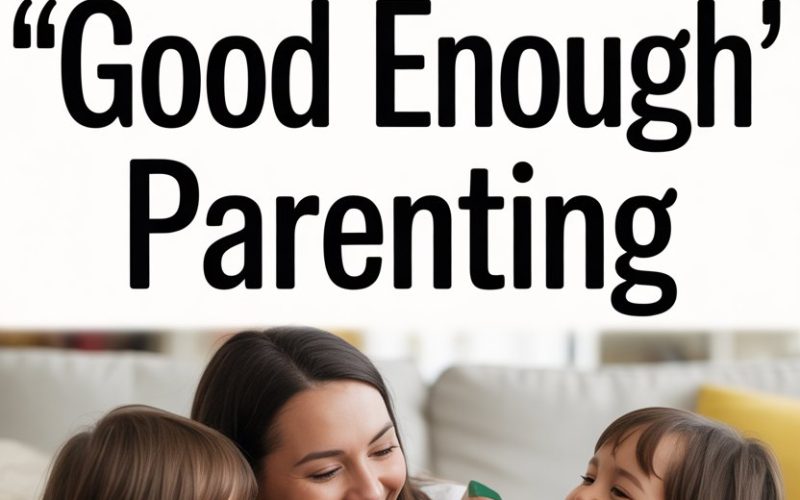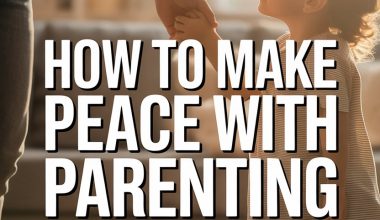Perfection is a myth. Especially when you have kids, a job, a partner who can’t find their own socks, and a dog that seems to shed exclusively on freshly cleaned floors.
Somewhere between Pinterest crafts and cold chicken nuggets lies a sanity-saving approach: “good enough” parenting.
No, this isn’t settling—it’s a philosophy. And it might just be the best thing you do for your children (and your own peace of mind).
Celebrating Imperfection
Instagram would have us believe that good parenting involves home-baked sourdough, screen-free toddlers, and a living room decorated in creams and whites—without a single sticky fingerprint.
But real life comes with snotty noses, forgotten permission slips, and the odd tantrum in aisle five.
The “good enough” approach isn’t about lowering the bar. It’s about setting it where you and your family can clear it most days, with only the odd shin scrape.
Psychologist Donald Winnicott coined the term “good enough mother” in the 1950s, reassuring generations of parents that children don’t need (or even want) robotic perfection.
Turns out, resilience is built by seeing that adults make mistakes—and recover from them.
Why “Good Enough” is Actually Great
Children thrive when they feel loved, seen, and safe. Everything else? Details.
They won’t remember whether you made organic parsnip mash or microwaved chicken dippers. They’ll remember being read to, being hugged, and the general feeling that home was a soft place to land.
In fact, research shows that hyper-parenting can actually backfire, leading to anxiety and perfectionism in kids.
A research says that embracing imperfection fosters confidence and flexibility—two ingredients for lifelong well-being.
Spotting the Perfection Trap
Ever find yourself up at midnight, hot-gluing feathers onto a World Book Day costume, even though your child wanted to go as “something comfy”? That’s perfectionism in action. Here are a few classic signs:
- Guilt over every shortcut (“I bought birthday treats instead of baking them!”).
- Obsessive monitoring of screen time, snack time, and… well, all the times.
- Comparing yourself to other parents—especially those who seem to have it all together.
If any of this sounds familiar, welcome to the club. There are millions of members and not a single perfect one.
What “Good Enough” Looks Like Day-to-Day
You get up, the kids are fed (eventually), and nobody leaves the house shoeless—today is already a win.
“Good enough” means some meals are nutritious and others come from a box. Some evenings end in story time, others with everyone falling asleep on the sofa during Paw Patrol.
It’s showing up, loving fiercely, and accepting that the rest is a mixed bag.
Occasionally, you’ll yell. You’ll forget the forms. You’ll have cereal for dinner. And your kids will be just fine.
The Science of “Good Enough” Parenting
Psychologist Donald Winnicott’s famous theory is now backed by modern studies. Children need parents who are responsive and generally reliable—not flawless automatons.
Minor failures (a missed bedtime story, a late pickup) help children learn the world isn’t always perfect, and that’s okay.
According to child development experts, these small stumbles actually encourage independence and adaptability. If you’re worried every slip-up will scar your child for life, breathe. Little lapses can be valuable lessons.
Practical Steps to Embrace “Good Enough” Tonight
Ready to loosen the cape? Here’s how busy parents can make “good enough” more than a mantra.
Drop the comparison game
Scrolling social media is like peeking into the neighbours’ windows while they’re hosting a cleaning commercial. Nobody posts their toddler’s apocalyptic meltdown or the night they accidentally served dog biscuits as snacks (it happens).
Only compare yourself to yourself—and even then, be generous.
Pick your battles
If you’d rather gouge your own eyes out than debate sock choices every morning, maybe mismatched socks become the new family trend. Decide what’s worth a stand; let the rest go.
Does it really matter if pyjamas end up as school clothes just once? (Not in the grand scheme.)
Lower the bar—just a bit
Children’s needs are simple. Nutrition, safety, love, and the occasional bath.
If everyone is fed, mostly clean, and laughing once in a while, you’re nailing it. Everything else is gravy.
Embrace shortcuts—and shout about them
There is no moral victory in struggling unnecessarily.
Bagged salad? Yes, please. Frozen pizza? A lifeline.
If you buy the cake for the class party, own it. You’re supporting local business.
Apologise and model recovery
Messed up? Lost your cool over spilled juice? Apologise, show your child how adults handle mistakes, and move on.
Kids learn more from our repairs than our rare moments of perfection.
Prioritise connection over perfection
A ten-minute card game or cuddle beats an hour spent folding laundry in silence. Quality time doesn’t have to be scheduled or Instagram-worthy—it just has to happen.
Even if it’s in a blanket fort made from unironed sheets.
Letting Go of the Myth of Balance
“Having it all” is fiction—no one’s got the equation sorted. Some days work wins, other days family does.
A bit of see-sawing is normal, not a sign of failure.
When the balls drop (and some will), resist the urge to spiral. Self-compassion is contagious.
When you forgive yourself, your kids learn to do the same.
Self-Care Isn’t Selfish
Parents who believe they must martyr themselves for their children often end up too frazzled to enjoy any of it. “Good enough” means sometimes handing over the iPad and taking a guilt-free shower.
Sometimes it means putting yourself to bed early instead of folding washing at 10pm.
When your cup’s not empty, you’re a better parent—no martyrdom required. The Child Mind Institute even says self-compassion enhances patience and emotional regulation, which your kids will thank you for (eventually).
The Power of Saying “No”
Overcommitting is the enemy of sanity. One after-school activity per child? That’s plenty.
You don’t have to attend every bake sale or school committee meeting. Kids need parents who are present, not parents who are omnipresent.
Politely declining extras gives your family the space to just “be.” And that’s where the memories are made, between the cracks of doing nothing much.
The Role of Community
No parent is meant to raise a child in isolation.
Whether it’s mates, family, or the parent from the school run who always seems to have a half-eaten rice cake in their pocket, lean on others. Swap favours, share stories, and laugh at the mayhem.
Connection is a lifeline—and occasionally, someone else’s child will smear jam on your sofa, and you’ll realise it’s all normal.
When Guilt Knocks (and It Will)
Guilt is the background music of parenting. It pipes up when you’re late to pick up, forget the library book, or let your child eat chips for breakfast.
Name it, shrug it off, and move on. If you’re present, loving, and trying (most days), you’re doing just fine.
Teaching Your Kids to Be “Good Enough,” Too
Perhaps the greatest gift you can give your children is the permission to be human. If they see you striving, failing, laughing, and loving through it all, they pick up a lifelong lesson: they don’t have to be perfect either.
Encourage effort, kindness, and resilience. Praise the process, not the product.
Celebrate the B- as much as the A+, and the attempt as much as the win.
Making Peace with “Good Enough”
If you’re looking for permission to stop chasing some mythical standard, here it is. Your kids don’t need a super-parent—they need you, mess and all.
And when you’re still up at 2am worrying whether you’re doing enough, remember: the fact that you care is proof you’re already more than “good enough.”
Now, put the glitter glue away, pour yourself a cuppa, and enjoy your perfectly imperfect family. That’s a win no shiny social post can top.





